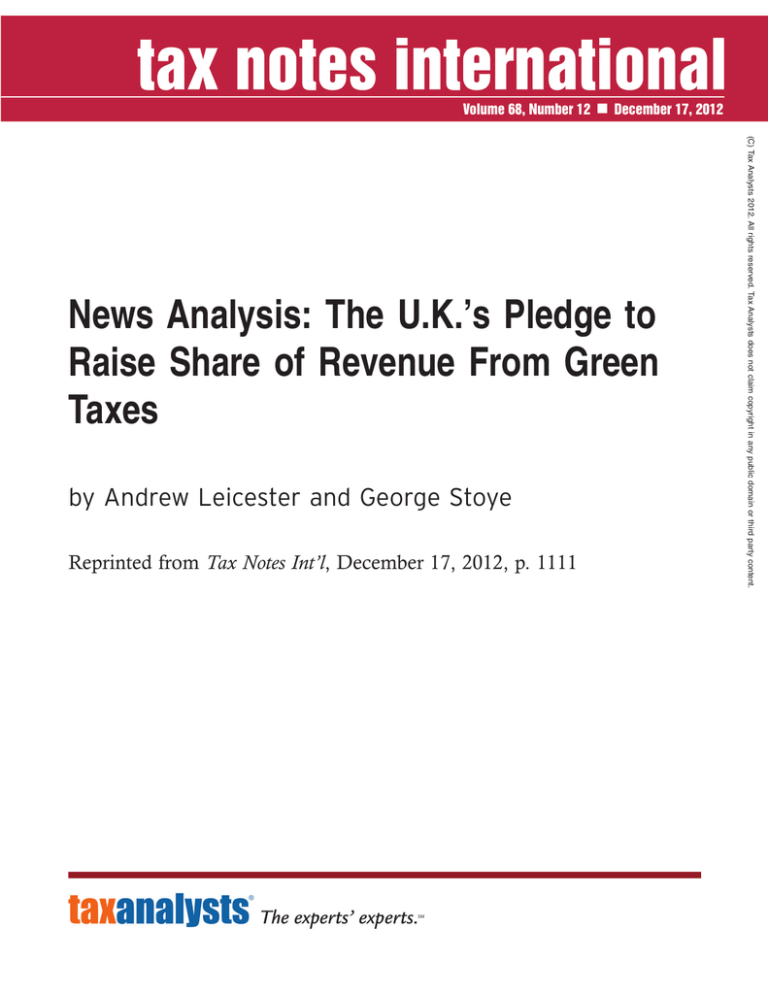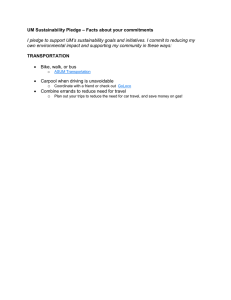News Analysis: The U.K.’s Pledge to Taxes
advertisement

Volume 68, Number 12 December 17, 2012 by Andrew Leicester and George Stoye Reprinted from Tax Notes Int’l, December 17, 2012, p. 1111 (C) Tax Analysts 2012. All rights reserved. Tax Analysts does not claim copyright in any public domain or third party content. News Analysis: The U.K.’s Pledge to Raise Share of Revenue From Green Taxes Reprinted from Tax Notes Int’l, December 17, 2012, p. 1111 NEWS ANALYSIS The U.K.’s Pledge to Raise Share of Revenue From Green Taxes Amidst all the discussion of U.K. Chancellor George Osborne’s fiscal measures following the autumn statement, rather less attention has been paid to another tax-related target. The coalition agreement1 set out a commitment to ‘‘increase the proportion of tax revenue accounted for by environmental taxes.’’ The Environmental Audit Committee2 reported last month that whether or not this pledge is met depends on how environmental taxes are defined. This article looks at the status of that pledge after the autumn statement and asks whether such a target is sensible in the first place. (For prior coverage of the autumn statement, see Doc 2012-25002 or 2012 WTD 236-8.) The Treasury finally clarified its interpretation of the pledge in July:3 • environmental taxes should make up at least as big a part of total revenue in 2015-2016 as in 2010-2011; and • taxes whose primary objective is to encourage proenvironmental behavior change (as opposed to raising revenue, for example) count as ‘‘environmental.’’ International bodies such as the OECD4 and Eurostat,5 however, define environmental taxes not according to their intent, but on whether the tax encourages pro-environmental outcomes. On that basis, the Office 1 See http://www.direct.gov.uk/prod_consum_dg/groups/ dg_digitalassets/@dg/@en/documents/digitalasset/ dg_187876.pdf. 2 See http://www.publications.parliament.uk/pa/cm201213/ cmselect/cmenvaud/328/328.pdf. 3 See http://www.hm-treasury.gov.uk/press_60_12.htm. 4 See http://stats.oecd.org/glossary/detail.asp?ID=6437. 5 See http://epp.eurostat.ec.europa.eu/statistics_explained/ index.php/Environmental_taxes. TAX NOTES INTERNATIONAL for National Statistics (ONS)6 classifies taxes such as fuel duty and air passenger duty as environmental, which the Treasury does not. The table summarizes the Treasury and ONS definitions of environmental taxes. We also suggest a third definition, which perhaps best reflects all the taxes that are environmental either in terms of intent or outcome, and for which we have revenue forecasts to 2015-2016. This definition includes company car taxes, which — like vehicle excise duty — depend on the fuel efficiency of the car. However, in line with international practice, the definition excludes the VAT on fuel duty because VAT is a general consumption tax rather than a particular environmental tax. As shown at the foot of the table, we find that the definition of green taxes does indeed affect whether or not the target is met. Using the Treasury definition, the government would easily meet its pledge: the green tax share is set to more than double, from 0.4 percent to 0.9 percent of revenues. Green taxes in 2015-2016 could fall by £3.3 billion (56 percent of forecast environmental receipts that year) before the target is missed. Under the ONS definition, however, the green tax share will fall from 7.8 percent to 7.1 percent of revenues, breaching the target. Revenues from this set of taxes would have to rise by £5.3 billion (11 percent) in 2015-2016 to meet the target. Under the third suggested definition, the pledge is also missed, with the green tax share falling from 7.3 percent to 7 percent. Green taxes would need to rise by £2.3 billion (5 percent) to hit the target. Why do the results differ? Total green taxes are substantially lower under the Treasury definition, mainly because it excludes fuel duties, which are expected to raise an estimated £27.8 billion in 2015-2016. Including fuel duties makes the pledge much harder to meet: Their share of total revenues is set to fall by 0.8 percentage point by 2015-2016. 6 See http://www.ons.gov.uk/ons/guide-method/methodquality/specific/economy/environmental-accounts/monetaryaccounts/government-revenues-from-environmental-taxes.pdf. DECEMBER 17, 2012 • 1 (C) Tax Analysts 2012. All rights reserved. Tax Analysts does not claim copyright in any public domain or third party content. COUNTRY DIGEST COUNTRY DIGEST Reprinted from Tax Notes Int’l, December 17, 2012, p. 1111 Three Definitions of Environmental Taxes and Compliance With Target HM Treasury IFS Aggregates levy • • Air passenger duty • • Carbon reduction commitment • Climate change levy (including carbon price floor) • • • • • Company car taxes • EU emissions trading scheme auctions • • Fuel duties • • • • Renewables obligation • • VAT on fuel • Vehicle excise duty • Landfill tax 2010-2011 revenue £ billion (% of total) 2.1 2015-2016 forecast revenue £ billion (% of total) 5.8 Target met? ✔ (0.4%) 42.8 (0.9%) 47.4 x • (7.8%) 40.2 (7.1%) 46.9 (7.3%) (7.0%) x Note: Figures for 2010-2011 are outcomes, whereas figures for 2015-2016 are forecasts. Revenue figures are taken from the Office for Budget Responsibility Economic and Fiscal Outlook, consistent with the December 2012 autumn statement. The exception is company car taxes, where forecasts are taken from a July 16 written ministerial statement to the House of Commons from Economic Secretary to the Treasury Chloe Smith. Excluding fuel duties also allows the chancellor to make further concessions on duties in future years without jeopardizing the target. Indeed, if fuel duty is not considered an environmental tax, it actually makes the target easier to meet by reducing total ‘‘nonenvironmental’’ revenues. The autumn statement announced that the planned duty increase for January 2013 is to be canceled and that future planned inflation adjustments in duties have been pushed back by five months from April to September each year. Together, these reforms are expected to cost around £1.7 billion in 2015-2016, the year in which compliance with the green tax target is to be judged. This is almost the entire amount by which, under our definition of environmental taxes, the pledge would be breached. It may well be reasonable to take different views on the precise definition of a green tax. More fundamentally, we should ask whether the pledge to raise green taxes’ importance in total revenues has any particular merit, setting aside the definitional issues. Ideally, taxes (including green taxes) should be raised in the most effective way, rather than to hit some essentially arbitrary target for receipts from one part of the system. Whether environmental taxes make up a bit more or a bit less of total revenues in 2015-2016 than they did in 2010-2011 is not of much real consequence. Moreover, the green tax share of revenues is not really a good indicator of a government’s environmental credentials. The tax system can be ‘‘greened’’ without raising more 2 • DECEMBER 17, 2012 money: Reforms to the vehicle excise duty to base payments on fuel efficiency are one example. Other environmental policies such as regulation and subsidies operate outside the tax system but could still have important environmental benefits. Some green tax revenues may erode away as people change their behavior in response to the tax. The green tax share also depends on total revenues, which can be very sensitive to overall macroeconomic conditions. It took the government more than two years to lay out the rules against which it wished its green tax target to be judged. In the end, its chosen definition makes the pledge easy to accomplish but implies a very limited role for green taxes. If they really do make up less than 1 percent of total receipts, any ambition to move toward a significant role for such taxes in the future (such as that adopted by the Liberal Democrats at their 2010 conference)7 appears to be a very long way away. More fundamentally, pledging to meet certain targets that are then defined in such a way as to make them trivial — both to meet and in their apparent importance — does not look like an effective way of 7 See http://www.libdems.org.uk/ economy_detail.aspx?title=Green_Taxation__carried&pPK=351de428-542d-4d18-802c-b11c297e174b. TAX NOTES INTERNATIONAL (C) Tax Analysts 2012. All rights reserved. Tax Analysts does not claim copyright in any public domain or third party content. ONS Reprinted from Tax Notes Int’l, December 17, 2012, p. 1111 TAX NOTES INTERNATIONAL ♦ Andrew Leicester and George Stoye,Institute for Fiscal Studies, London This was originally published as an ‘‘Observation’’ by the Institute for Fiscal Studies (http://www.ifs.org.uk/). DECEMBER 17, 2012 • 3 (C) Tax Analysts 2012. All rights reserved. Tax Analysts does not claim copyright in any public domain or third party content. gaining credibility. A green tax definition more in line with international convention would be much more constraining and would require the government to take policy action. As a result, there will almost certainly be an argument at the next election about whether the pledge was met. A better argument would be that it wasn’t really worth making in the first place. ◆ COUNTRY DIGEST




